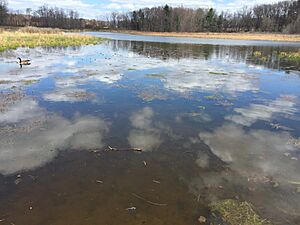Frost Entomological Museum facts for kids
| Established | 1969 |
|---|---|
| Location | Penn State University, University Park, Pennsylvania, U.S. |
| Type | Natural History Museum |
| Collection size | 2 million specimens |
The Frost Entomological Museum is a cool place at Penn State University in University Park, Pennsylvania. It's like a giant library for insects and other small creatures! Scientists use it to study bugs, and there's also a public area where you can see amazing exhibits.
The museum started in 1969. But many of the insects collected there are much older, some even from the late 1800s!
Contents
Discover the Frost Entomological Museum
The Frost Entomological Museum is a very active place for research. This means scientists work there to learn more about insects. They have a huge collection of over 1.3 million arthropod specimens. Arthropods are creatures like insects, spiders, and crabs.
What's Inside the Museum?
The museum's collection helps us understand the many different kinds of insects living in Pennsylvania and the eastern United States. It's like a historical record of bug life! Here are some of the amazing collections you can find:
Aphids: Tiny Plant Eaters
- The John O. Pepper aphid collection has more than 32,000 mounted specimens.
- These tiny insects, called aphids, are known for sucking sap from plants.
- This collection shows at least 800 different kinds of aphids.
- It's especially strong in aphids found in central Pennsylvania.
Sucking Lice: Small Parasites
- The K. C. Kim collection has over 15,000 slide-mounted sucking lice.
- Sucking lice are very small insects that live on animals.
- This collection represents about 300 different species.
Dragonflies and Damselflies: Flying Jewels
- The George H. and Alice F. Beatty Collection is huge!
- It includes more than 60,000 dragonfly and damselfly specimens.
- These were collected from the 1940s through the 1970s.
- More than 1,000 different species are in this collection.
- About half of these beautiful insects were collected in Mexico.
Dr. Stuart W. Frost's Special Interests
The museum is named after Dr. Stuart W. Frost. He was a very important insect scientist. Some special collections reflect his interests:
- Leaf Miners: These are tiny insects whose larvae tunnel inside plant leaves.
- Light-Trapped Insects: Dr. Frost used special lights to attract and collect insects at night.
- Archbold Biological Station Arthropods: He also studied insects from the Archbold Biological Station in Florida.


